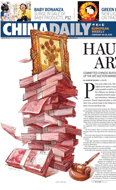Dan Steinbock
The G7 itch in G20 times
Updated: 2011-02-18 08:17
By Dan Steinbock (China Daily)
Since its summit in Seoul, G20 has been increasingly criticized in the West. But with the shift in economic and political power from the West to the East, G20 reflects inclusive growth.
On Feb 18 and 19, finance officials of the world's 20 leading economies and representatives of international financial institutions will gather for the first high-level meeting under France's yearlong G20 presidency. The meeting takes place amid sluggish recovery in the advanced economies and broader growth in the large emerging economies. It also comes when the debate over G20's role has intensified.
French President Nicolas Sarkozy has laid out an ambitious agenda for the G20. The 20 economies' finance officials hope to tackle the eurozone's debt crisis, currency policy, financial regulation, the representation of non-G20 countries at future meetings, and a slate of other economic problems plaguing rich and developing countries alike.
But conflicting interests between the G20 countries constrain dramatic changes over issues in which trillions of dollars are at stake. If the French are hoping for the seemingly unattainable, some Americans are hoping for nothing - or so it seems.
We are now living in a "G-zero world", in which no single country or bloc of countries has the political and economic leverage, or the will, to drive an international agenda, argue Ian Bremmer, president of Eurasia Group, and Nouriel Roubini, a professor at New York University's Stern School of Business. Because of that they see "intensified conflict on the international stage over vitally important issues, such as international macroeconomic coordination, financial regulatory reform, trade policy and climate change".
Ironically, Roubini is among the few experts who earlier predicted that the West would be swept by a global financial crisis, while Bremmer warned about instability in the developing world. Now, both are looking nostalgically to the very same regime - the Washington Consensus - that contributed the most to the global financial crisis in the first place.
The problem is not just the difficulty of cooperation among the G20 countries. Rather, it is that these countries have in the foreseeable future the unfortunate task of cleaning the mess created by G7 nations, a small group of advanced and prosperous economies.
Since G20 represents advanced and emerging economies both, it is bound to be driven by diverging interests and values. As a result, progress is likely to be gradual rather than disruptive.
Starting in the mid-1970s, leaders from G7 have gathered annually to discuss and coordinate financial and economic policies. In the 1990s, large emerging-market economies, first China and later India, began to enjoy more sway in the world economy, while the Asian financial crisis demonstrated that emerging economies were simply too important to be excluded from international economic discussions.
G20 was formed formally in 1999 as a platform for finance ministers and central bank governors of both developed and emerging economies to discuss financial issues. But it remained a less prominent forum than G7.
E-paper

Ear We Go
China and the world set to embrace the merciful, peaceful year of rabbit
Preview of the coming issue
Carrefour finds the going tough in China
Maid to Order
Specials

The green lantern
Environmental concerns are shedding new light on a colorful tradition

Inland interchange
Chongqing bets on its position as a hub for China's west.

Zooming in on Chinese skies
Helicopter companies ride on country's growing interest in luxury aviation.
